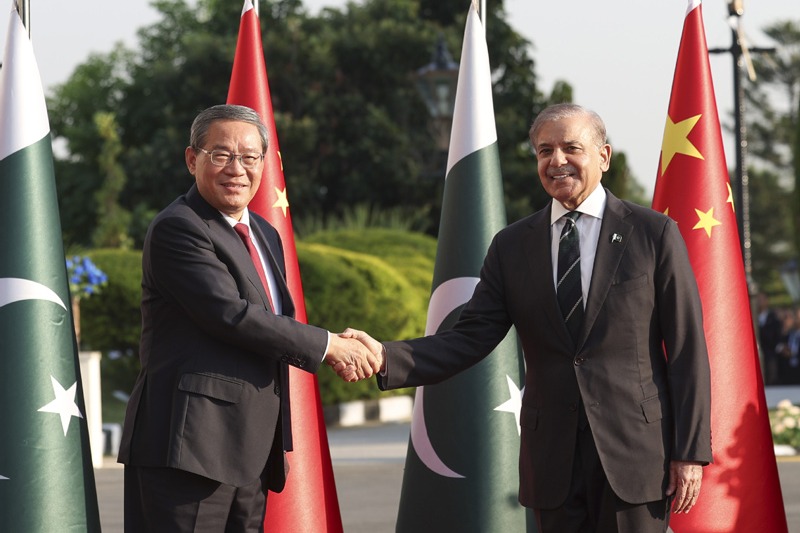Xi says China and Equatorial Guinea are good friends and partners


by Xinhua writers Wang Ze, Lyu Chengcheng
MALABO -- China and Equatorial Guinea are good friends and partners, Chinese President Xi Jinping said Tuesday during his talks with Teodoro Obiang Nguema Mbasogo, president of the Republic of Equatorial Guinea, in Beijing.
Since establishing diplomatic relations 54 years ago, China and Equatorial Guinea have been helping each other through thick and thin, and maintained friendly cooperation and exchanges in various fields, yielding fruitful results.
HOPE PRIMARY SCHOOL
The friendship between both peoples has also strengthened. During talks with President Obiang in Beijing, President Xi expressed appreciation for the kindness the Equatorial Guinea people have shown to the Chinese.
"We will always remember your kindness to the people in the Wenchuan earthquake disaster area and your donation to the construction of Hope Primary School in Jinping County, Yunnan Province," Xi said.
"Such mutual support between the two countries is a vivid illustration of the sincere friendship and joint development between China and African countries," he added.
In April 2015, President Obiang announced during his visit to China that Equatorial Guinea would donate a school in Jinping County in China's southwestern Yunnan Province as a gesture of goodwill and solidarity with the Chinese people.
The construction of the China-Equatorial Guinea Friendship Primary School was completed in 2016, and it has since stood as a testament to the enduring friendship between the two countries.
"The children found themselves in spacious and bright classrooms within a five-story building, and the once muddy hillside was transformed into a well-built playground," said Ran Hongyan, the school's principal.
Ran added that the school, which now accommodates over 2,000 students from 16 different ethnic groups, has a special exhibition room to display the children's photographs, crafts and paintings about the friendship between the two countries.
"Our teachers would tell us about the history and friendship between our school and Equatorial Guinea," said fifth-grader Ma Ziyi.
"Talent is the future," Obiang told Xinhua in a recent interview before his China trip, expressing his satisfaction with the children's education and the school's facilities. "In this regard, we share a profound consensus with China, and that is precisely why we donated this elementary school."
SEEDS OF FRIENDSHIP
Since 1977, China has been accepting students from Equatorial Guinea, which has helped strengthen cultural exchanges between the two nations. In order to deepen educational cooperation and foster mutual understanding, the two countries decided in a joint statement on the establishment of an all-round partnership of cooperation in April 2015 that China will "continue to provide government scholarships to Equatorial Guinea" and the two countries will run a Confucius Institute at the National University of Equatorial Guinea.
Milagrosa Ada Micha, an Equatorial Guinean beneficiary of a Chinese scholarship, pursued her university studies in China. While at the University of International Business and Economics, she established a magazine named "Real Equatorial Guinea," which served as a platform for introducing her country to classmates and teachers in Chinese, English and Spanish.
After she returned to Equatorial Guinea, the magazine became an official media outlet showcasing news about both countries. Later, she launched an electronic version with daily updates and more diverse content, including increased news coverage about China.
Ada Micha not only acquired professional knowledge but also learned about the self-discipline, diligence, and wisdom of the Chinese people. "China is my second homeland. What I saw and learned in China changed my life," she said. "I hope more young people can learn about China, the country of the future."
In January 2016, the Confucius Institute was established at the National University of Equatorial Guinea, providing young people like Ada Micha with more opportunities to learn about Chinese culture. "When I was a child, Chinese people came to our village to teach farming techniques," said Jose Antonio Nguema, a 21-year-old student. "They were very friendly and taught me to say 'hello' and 'goodbye' in Chinese."
Since then, a "seed of friendship was sown in my heart," Nguema said. Upon entering university, Nguema was delighted to find a Confucius Institute on campus and eagerly enrolled in Chinese classes. "I have traveled to China twice through the 'Chinese Bridge' program. To me, China represents the future," he said. "After graduation, I hope to pursue further studies in China, focusing on education."
"The cooperation between the two countries promotes cultural exchanges, enhancing mutual understanding," said Fernando Garcia, the Equatorial Guinean director of the Confucius Institute at the National University of Equatorial Guinea. "I believe the bridge of cultural exchange between the two countries will become wider, bringing the hearts of the people closer together."
FRIENDSHIP OF MUTUAL SUPPORT
Over the decade, China has also been helping the African country with its development, particularly in infrastructure.
A tall, silver-white building with an arched roof stands on the northern coast of Bioko Island, where the country's capital city of Malabo is situated. As travelers disembark, tourists raise their phones to snap pictures of the impressive new terminal of Malabo International Airport.
Constructed by a Chinese enterprise, the airport was inaugurated in May 2022. "This airport has given us a new vision and is our pride," said a resident, Maria. Maria, who did not give her full name, said the old airport was small and outdated, providing a subpar experience for international visitors. The new airport is modern and beautiful, emerging as a shining symbol of the country.
"Many of our infrastructure projects are undertaken by Chinese companies, and we are very reassured," said Alejandro Micha Nsue, director of the National Office of Project Planning and Monitoring Project of Equatorial Guinea.
The country's former Prime Minister Francisco Pascual Obama Asue said that through the Forum on China-Africa Cooperation and the China-proposed Belt and Road Initiative, China has implemented a series of projects that fosters the development of African countries.
In a small restaurant north of Bata city, 50-year-old owner Constancia Ondo retrieved a cold beer from the fridge and brought it to a customer's table. A stable electricity supply and a functioning refrigerator were once luxuries for her but are now routine. Ondo said that she and many residents have benefited from the construction of the Djibloho Hydropower Station.
In Centro Sur Province, the Wele River rushes forth from the dam of the hydropower station, creating a deafening roar as it cascades down. Built by a Chinese enterprise, the station is the largest hydropower facility in Equatorial Guinea, supplying 90 percent of the electricity for the continental region. Its operation marked the end of an era when streetlights did not work, and every household relied on a generator.
"With China's help, our national construction is displaying Equatorial Guinea features, which means closely linking national development with people's well-being," said Micha Nsue. Cooperating with China has given Equatorial Guinea and Africa hope and ambition for unity and revitalization.
China has launched the Initiative on Supporting Africa's Industrialization, the Plan for China Supporting Africa's Agricultural Modernization and the Plan for China-Africa Cooperation on Talent Development, which are effective ways for African countries to address development challenges and can genuinely help African countries develop, Obiang said.
Looking back over more than half a century since the establishment of diplomatic relations, China and Equatorial Guinea have always treated each other as equals, respected each other and supported each other, creating a model of South-South cooperation.
Looking ahead, China and Equatorial Guinea will join forces with other African countries to contribute even more to building a high-level China-Africa community with a shared future.
"I appreciate President Xi Jinping's initiative to help African countries," said Obiang. "I believe it is the most effective way for Africa to overcome all the difficulties it faces today."
- Beijing court sees more copyright disputes settled
- Agriculture IP protection to stimulate industrial innovation
- Sun Yat-sen University Institute to boost East-West exchanges
- Tower representatives exchange innovation insights in Chongqing
- Fudan University launches research center for astronomy, astrophysics
- Xi urges developing system of modern military theory





































